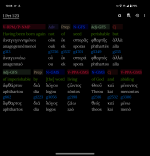I don't go too much for conjecture. There's far too much of that. I need some evidence.
You have it backwards. Logos is translated as Word.
G3056 λόγος logos (lo'-ğos) n.
1. a word, something said (including the thought)
2. (by implication) a saying or expression.
3. (by extension) a discourse (on a topic).
4. (informally) a conversation (on a topic).
5. (thus) a matter.
6. (also) a reasoning (of the mental faculty).
7. (hence) a reason (i.e. a motive).
8. (negatively) a rationalization (i.e. application of plausible reasoning on a faulty premise).
9. (by further extension) a calculation, computation, or an account (as an accounting of).
10. (hence) a reckoning or an inventory (as called to account).
11. (of asking) a question.
12. (specially, with the article in John) the Word of God (capitalized), the Divine Expression, the Creator, the Word of Yahweh (i.e. the Anointed One, whether pre- or post-incarnate; that is, when Jesus is not embodied in the unglorified state of the old flesh of clay man, being quite dependent upon the Holy Spirit in that humble state of subsistence; see John 1:1-14 and Philippians 2:6-11; Also see context 15 below).
13. (special use #2) the “Holy-word” of God (as the Holy Scriptures of the Old Testament).
14. (special use #3) the “Redemptive-word” of God (as the full counsel and instruction of the Good News of Redemption through trust in Jesus Anointed, our Savior and eternal High Priest; not merely its announcement).
15. (Note #1) (the three INTERTWINED MEANINGS of “Word† of God” and “word of God” can refer to a few simultaneous (and inseparable) contexts resulting in an intentional double or triple entendre; of special note is Hebrews 4:12 which should be understood simultaneously in all three contexts: 12, 14 and 13, in that order of priority).
16. (Note #2) (often, “the word” is used as a shortened form of “the word of God” throughout the New Testament, connoting any these preceding contexts/concepts; see Acts 4:29, Acts 4:31).
17. (Note #3) (Redemptive-word: this is the clear and instructive communication of the promised Redemption with sources including Old Testament passages from the Torah-Law, the Holy Prophets, and the Psalms, and in the whole New Testament: the Holy Angels at Jesus' birth, John the Immerser, Jesus our Glorious Savior, first Ambassadors who were eyewitnesses of these things, including Paul as one born “out-of-season,” also Mark and Luke, and through the continuously active and enabling ministry of the promised Holy Spirit who reminds us of and tutors us in these eternal matters).
[from G3004]
KJV: account, cause, communication, X concerning, doctrine, fame, X have to do, intent, matter, mouth, preaching, question, reason, + reckon, remove, say(-ing), shew, X speaker, speech, talk, thing, + none of these things move me, tidings, treatise, utterance, word, work
Root(s): G3004
Compare: G4487
See also: G3048, G3049, H1697





